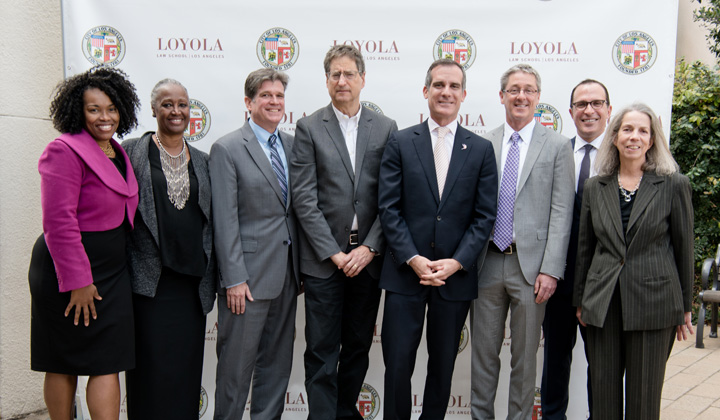Collateral Consequences of Conviction Justice Project Increases Aid to Underserved Clients with Sony Social Justice Fund

LMU Loyola Law School’s Collateral Consequences of Conviction Justice Project Director Elie Miller
The hardships faced when reentering society after a felony conviction can be crippling. “One bad mistake almost completely ruined my life,” said Curtis, a client whose name is shortened to protect his anonymity. “If you work to progress and change yourself, I feel like you should get a second chance, and that’s something that Loyola offers people like me.”
Returning citizens are often denied housing, driver’s licenses, and licenses for many jobs. They lose their right to vote and may be separated from their families. LMU Loyola Law School’s Collateral Consequences of Conviction Justice Project (CCCJP) helps these individuals navigate and overcome these collateral consequences of conviction. Since its establishment in 2017, the CCCJP has successfully trained 52 law students – and future attorneys – to provide these services by supervising their representation of 420-plus clients in more than 1,200 re-entry issues.
The CCCJP recently received a boost in funding thanks to a $500,000 gift from the Sony Social Justice Fund to increase the number of individuals helped by the CCCJP. The gift also allows the CCCJP to continue representing clients seeking to clear their records for purposes of employment, immigration, child support, and professional licensing.
“Sony wanted to make a real-life impact on anti-racism in our community. They hit the mark by supporting our students’ pro bono work expunging and sealing people’s records,” said Sean Kennedy, Kaplan & Feldman Executive Director of the Center for Juvenile Law & Policy, noting that the collateral consequences often have the most impact in disenfranchised communities.

In many instances, CCCJP clients are left with few employment prospects following convictions for low-level, nonviolent crimes. This often exacerbates and perpetuates income disparities that already exist in communities of color, which are disproportionately represented in the criminal justice system.
“People who are getting released from prison have a difficult time finding employment,” said CCCJP Director Elie Miller, a former public defender and in-house attorney at Homeboy Industries. “The CCCJP works with clients to prepare and file petitions seeking the dismissals of the clients’ eligible convictions. If the dismissal is granted, the clients can move forward to obtain employment.”
The gift is just the latest development in a long-running relationship between LMU Loyola Law School’s Center for Juvenile Law & Policy, Sony Pictures, and Tom Rothman, chairman of Sony Pictures Entertainment Motion Picture Group.
To support the work of that Collateral Consequences of Conviction Justice Project, visit here or contact Melissa Bersofsky, senior director of development, at melissa.bersofsky@lls.edu or 213.736.1195.